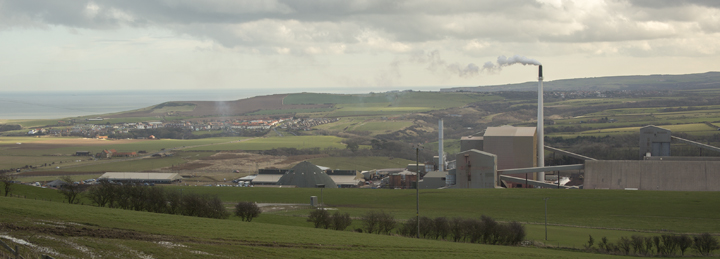Cobra
Coastal Behaviour and Rates of Activity
COBRA is an ongoing collaborative research project between the Department of Geography, Durham University, and Cleveland Potash Ltd, beginning in 2002. Our research is focussed on the coast of the North York Moors National Park, with particular interests between Skinningrove and Whitby. This stretch of coastline varies dramatically, with some of the UK’s highest near-vertical rock cliffs, softer glacial tills, extensive rocky foreshores and sandy beaches. Human modification of this coastline is recognised in its status as the North Yorkshire and Cleveland Heritage Coast, in part reflecting a history of mineral extraction that has supported the local and regional economy for several centuries. The coastline presents a fascinating natural laboratory for research into the geomorphology of coastal and hillslope processes in an area of considerable interest to many stakeholders.

The Boulby Mine, operated by Cleveland Potash Limited
The Boulby Mine is the UK’s only commercial potash mine and is the most important non-hydrocarbon mineral operation in Britain (BGS, 2011). Potash is a generic term for potassium-bearing minerals that are one of the three primary nutrients essential for plant growth, the others being nitrogen and phosphorus. Potash is used as an organic fertilizer and replaces potassium removed from the soil through harvesting and grazing. Potash is essential in the production, transport and accumulation of plant sugars, assists with hardiness and resistance to stress, pests and disease. Boulby Mine, which started production in 1973 and employs over 1,000 workers, has mining operations covering some 13.5 km reaching approximately 11 km offshore to depths of up to 1,400 m.
Our research is focussed around the application of cutting-edge monitoring and modelling to understand this coastal landscape. In particular we are interested in coastal erosion and evolution, rock slope failure, wide-area ground deformation monitoring both on- and offshore, high-resolution remote sensing, bespoke geotechnical testing, and real-time monitoring. The findings of our research and the approaches that we have developed since 2002 have wider application both on the UK coastline, but also into many other settings including mountainous regions, high latitudes, and the developing world.
COBRA research addresses the following broad topics:
